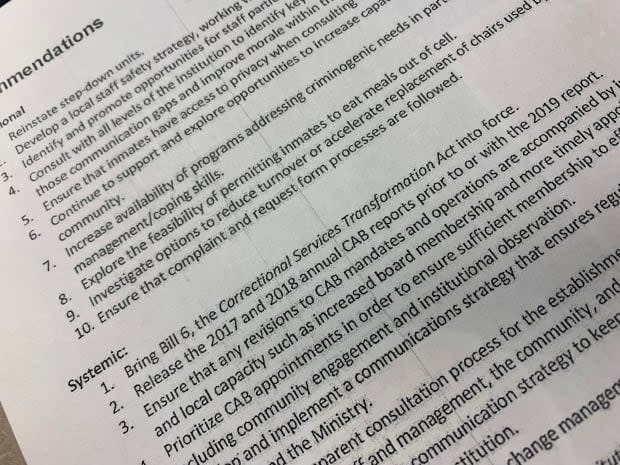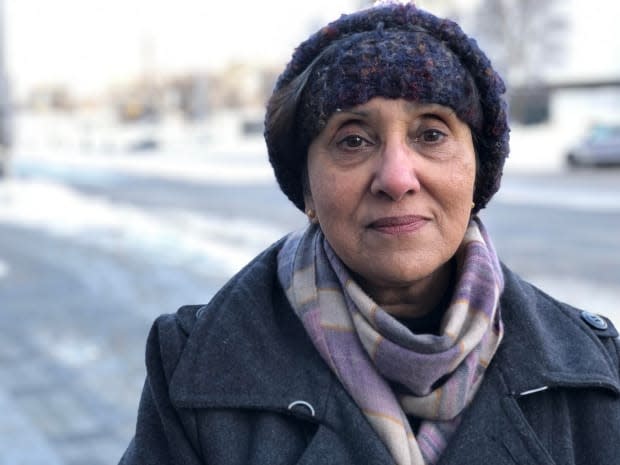Ontario government quietly disbands jail oversight boards

The Ontario government has quietly disbanded all 10 community advisory boards overseeing jails, removing what some call a key way to ensure proper treatment for the province's inmates.
The community oversight boards have existed since 2014 to oversee the treatment of inmates and recommend ways for jails to improve, according to its mandate on the government website.
Rebecca Jesseman, who used to chair the board overseeing the Ottawa-Carleton Detention Centre (OCDC) in Ottawa, said members of all boards were recently informed in a virtual meeting of the decision to shut them down on June 4.
"I'm disappointed. I really do think that the [boards] provide a really innovative way to promote transparency in an otherwise closed system," said Jesseman.
In an email statement, a spokesperson for the Ministry of the Solicitor General said an "extensive review" determined the "[boards] are not providing consistent meaningful local engagement despite the significant administrative investments into their maintenance and management."
Many advocacy groups, inmates, and even staff, disagree, saying board members were able to enter the jail at any time offering immediate access to address problems, as well as ensure full transparency on how inmates were treated.
The oversight boards were responsible for producing annual reports on jail conditions, which included recommendations on how to make improvements.
Those reports had been publicly accessible until the Ontario PCs changed course after the 2018 election, Jesseman said.

CBC News did obtain access to reports overseeing the Ottawa jail in 2017, 2018 and 2019 through a freedom of information request by the academic group Criminalization and Punishment Education Project (CPEP).
The reports listed recommendations on ways to improve conditions for staff and inmates with regards to food and mental health, as well as addressing a chronic health-care staffing shortfall. The reports also referenced the impact of larger systemic problems within jails, including segregation.
The ministry, which did not address why it stopped making reports public, said previous recommendations will continue to inform how it works to improve jail conditions.
Limits access to inmates
Jesseman disagreed with the ministry's assertion the boards were costly and lacked community engagement.
Reports from the board overseeing the Ottawa jail listed 60 on-site visits to the jail each year, as well as more than 20 community engagement events per year.
Jesseman also said every board member was a volunteer.
Other external oversight bodies, which have a legislated oversight authority, can fulfil the same role, a ministry spokesperson said. Those bodies include the Ontario Human Rights Commission, the Ontario Ombudsman, and the province's auditor general.
Farhat Rehman of the inmate family advocacy group Mothers Offering Mutual Support (M.O.M.S) believes this decision will limit access to inmates, especially when problems arise.
"Easy access to our loved ones has been taken away, so it's frightening for us," said Rehman.
She said the boards had authority to enter jails 24 hours a day, seven days a week, making them critical resources when problems arose.
"It seems like there was this safety net ... that has been taken away, and that's never a good thing when it comes to correctional services when so many lives are at stake," said Rehman.

The union representing jail staff, including officers at OCDC, is also critical of the ministry decision.
"This was a massive ministry fail," said Scott Forde, acting president of OPSEU Local 411 in Ottawa, adding "it was wrong to never publish their reports" which featured dozens of proposals to resolve staff training, retention and safety concerns.
"[These boards] went from being hesitantly welcomed to very welcome as they openly asked questions and considered information for improving staff, inmate and public safety," said Forde.
Signs of demise
Justin Piché, a University of Ottawa criminologist and co-chair of CPEP, said he is not surprised at the government's decision after it initially refused to release the annual reports through freedom of information.
Since 2018, Piché said the board mandate had been "eroded and undermined in its ability to communicate to public and serve as a community conduit about what's happening inside."
"We're in a pandemic, and I can't imagine a worse time to be dismantling oversight," said Piché.
In its statement, the ministry said it had challenges recruiting and retaining board members, and that as result they did "not always reflect the communities and the institutions" they represented.
Jesseman said the current PC government has stopped filling vacant seats since it came to power. The OCDC's annual report for 2019 asked the province to make appointments a priority.
"I don't think the potential that we had was ever realized," Jesseman said.

 Yahoo Finance
Yahoo Finance 